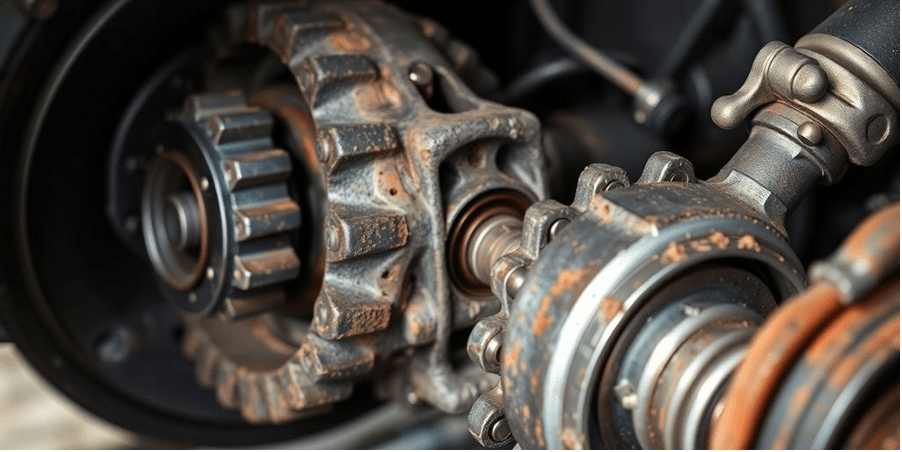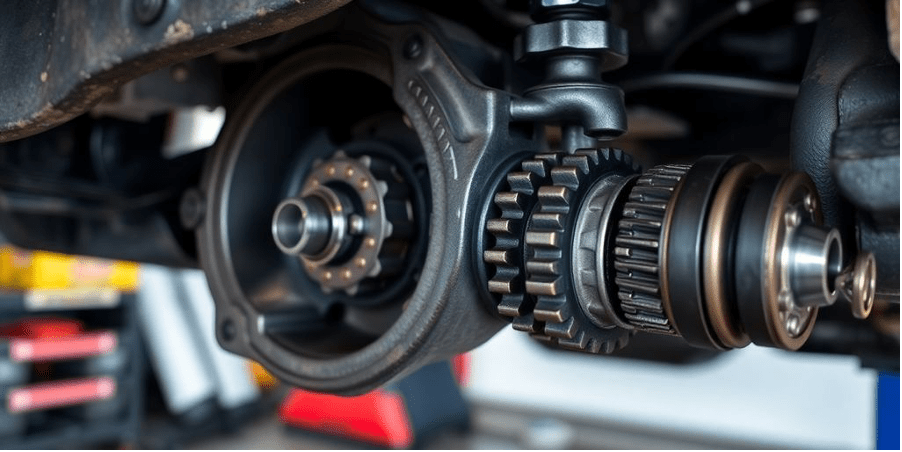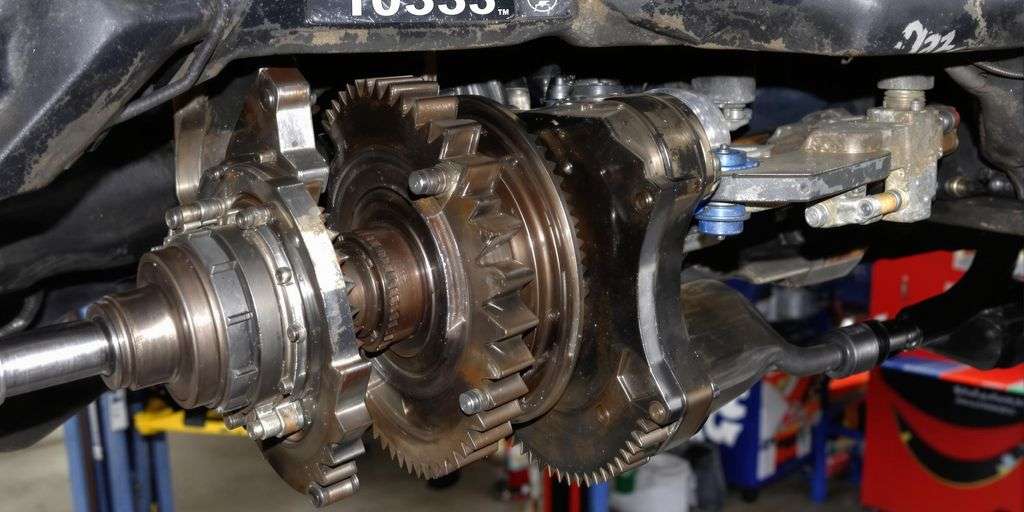Key Takeaways
- Understand the symptoms and causes of a faulty differential before selling your car.
- Prepare your car by assessing the damage and gathering necessary documents.
- Be aware of legal obligations, such as disclosure requirements and lemon laws.
- Highlight the car's strengths and target the right audience when marketing.
- Consider alternative options like repairs or trade-ins if selling proves difficult.
Understanding the Faulty Differential in Your Car

Common Symptoms of a Faulty Differential
So, you're driving along and suddenly you hear this weird noise coming from your car. Could be a popping sound during turns or maybe a low rumble. These are classic signs something's up with your differential. Other symptoms? You might notice some fluid leaking under your car or feel a kind of vibration when you're driving. If your car's not handling turns like it used to, that's another clue.
Causes of Differential Failure
Why do differentials fail? Well, there are a few reasons. A big one is just wear and tear over time. If the differential fluid isn't changed regularly, that can lead to problems, too. Sometimes, it's as simple as a seal that's gone bad. In other cases, there might be a problem with the gears themselves, like if they've worn down or gotten damaged somehow.
Impact of a Faulty Differential on Vehicle Performance
When your differential's on the fritz, your car's performance can really take a hit. You might find it harder to steer, especially when turning corners. The car could start to feel unstable, like it's not gripping the road properly. Plus, you might hear some unsettling noises coming from the back end of your vehicle. Ignoring these symptoms can lead to more serious damage, so it's important to get them checked out ASAP.
A faulty differential doesn't just make your car noisy or uncomfortable to drive; it can also pose a safety risk if left unchecked. Addressing these issues early can save you from bigger headaches down the road.
Preparing Your Car for Sale with a Faulty Differential
Assessing the Extent of Differential Damage
Before putting your car on the market, it's important to know just how bad the differential issue is. Start by listening for any unusual sounds like grinding or whining, which can indicate serious trouble. You might also notice fluid leaks under the vehicle, a common sign of a malfunctioning differential. A professional mechanic can provide a detailed assessment, helping you understand the severity of the problem.
Gathering Necessary Documentation
Having all your paperwork in order can make the selling process smoother. Gather maintenance records, repair receipts, and any warranties you might have. This not only builds trust with potential buyers but also shows that you've taken good care of the vehicle despite its current issues.
Setting a Realistic Price
Pricing a car with a faulty differential can be tricky. It's crucial to set a price that reflects the cost of repairs needed. Consider getting quotes for repair costs and factor these into your asking price. You might also want to check similar listings in your area to get an idea of what others are asking for cars in similar condition. Remember, being upfront about the differential issue can actually help you negotiate better.
Legal Considerations When Selling a Car with a Faulty Differential
Disclosure Requirements to Buyers
When you're selling a car with a faulty differential, it's important to be upfront about the issue. Honesty isn't just the best policy; it's the law. You need to inform potential buyers about the car's condition, specifically highlighting any known problems with the differential. This transparency helps maintain trust and avoids any potential legal disputes down the road. It's a good idea to document these disclosures in writing, which can serve as proof that you were clear about the car's issues.
Understanding Lemon Laws
Lemon laws are designed to protect consumers from defective vehicles, but they can also impact sellers. While these laws vary by state, they generally require sellers to disclose major defects. If the car is still under warranty, the lemon laws might still apply, meaning the buyer could potentially return the car if the differential issue isn't resolved. Familiarize yourself with your state's specific lemon laws to ensure compliance.
Transferring Ownership Legally
The process of transferring ownership of a car with a faulty differential involves more than just handing over the keys. You must complete the necessary paperwork to legally transfer the title to the new owner. This typically includes a bill of sale and a title transfer form. Make sure all sections are filled out accurately to avoid any future complications. It's also wise to keep a copy of all documents for your records.
Selling a car “as-is” can be a straightforward way to transfer ownership, but it's crucial to clearly state this in the sales agreement. This means the buyer accepts the car in its current condition, faults and all, which can protect you from future liability.
Marketing Strategies for Selling a Car with a Faulty Differential
Highlighting the Car's Positive Features
When selling a car with a faulty differential, you want to shine a light on its good aspects. Maybe it has a low mileage, a spotless interior, or recent upgrades like new tires or a sound system. Make a list of these strengths and be ready to share them. This will help potential buyers see the car's value beyond its current mechanical issues.
Targeting the Right Audience
Finding the right buyer is key. Look for folks who might be interested in a project car or someone who has the skills to fix it themselves. Consider reaching out to car enthusiasts or mechanics who might see the potential in your vehicle, even with its differential problem.
Utilizing Online Platforms Effectively
Online platforms can be a goldmine for selling cars, even those with issues. Use sites like Craigslist, Facebook Marketplace, or specialized forums for car repairs and sales. Make sure your listing is detailed, honest, and includes plenty of photos. A clear description can help manage expectations and attract the right buyers.
When selling a car with mechanical issues, honesty is your best policy. Disclose the differential problem upfront to build trust with potential buyers and avoid future disputes.
Negotiating the Sale of a Car with a Faulty Differential
Handling Buyer Objections
When selling a car with a faulty differential, expect buyers to raise concerns. They'll likely question the cost of repairs or the car's reliability. Address these objections openly. Be upfront about the car's condition and any known issues. This honesty can help build trust. You might also consider offering a discount to cover potential repair costs, which can make the deal more appealing.
Offering Test Drives Safely
Test drives are essential, even when the car isn't in perfect shape. Ensure the vehicle is safe to drive by checking the basics—like brakes and lights—beforehand. If the differential issue affects driving, explain the symptoms to potential buyers. Let them know what to expect, so there are no surprises. It’s also wise to accompany them during the test drive to answer any questions they might have.
Finalizing the Sale Agreement
Once you find a buyer who understands the vehicle's condition, it’s time to finalize the sale. Prepare a bill of sale that clearly states the car is being sold “as-is”. This means the buyer accepts the vehicle's condition without expecting future repairs from you. Selling a vehicle “as-is” is common, and it protects you from post-sale complaints. Make sure all paperwork is in order, including the title transfer and any necessary disclosures. This step ensures a smooth and legally sound transaction.
Negotiating the sale of a car with mechanical issues can be tricky, but with transparency and the right approach, you can find a buyer who sees the vehicle's potential beyond its current problems.
Alternative Options to Selling a Car with a Faulty Differential

Considering Repair or Replacement
Before deciding to sell your car with a faulty differential, think about whether fixing or replacing it might be a better option. Repairing the differential could potentially save you money in the long run, especially if the rest of your car is in good shape. Here's what you might want to consider:
- Cost Evaluation: Compare the costs of repairing versus replacing the differential. Sometimes, the repair might be significantly cheaper.
- Mechanic's Opinion: Get a professional assessment to understand the extent of the damage and the feasibility of a repair.
- Longevity: Consider how long you plan to keep the car. If it’s a long-term vehicle for you, investing in a repair might be worthwhile.
Exploring Trade-In Opportunities
If repairs seem too costly or impractical, trading in your car could be a viable option. Many dealerships offer trade-in deals even for cars with mechanical issues. Here’s how you can approach it:
- Research Values: Check the trade-in value for your car with its current condition. Use resources like Kelley Blue Book to get an idea.
- Negotiate: Be prepared to negotiate with the dealer. Knowing the value of your car can give you leverage.
- Consider Upgrades: Think about trading up to a newer model. Sometimes, dealers offer deals for trading in old cars for new ones.
Donating the Car to Charity
Another option is to donate your car to a charity. This can be a good way to dispose of a car that’s too costly to fix while also doing some good. Here’s why it might be appealing:
- Tax Deduction: Donating can provide you with a tax deduction, which might offset some of the car's value.
- Hassle-Free: Charities often handle the towing and paperwork, making it a convenient option.
- Supporting a Cause: Your donation can support a charity that you care about, making it a meaningful choice.
Sometimes, letting go of a problematic car doesn't have to be a loss—it can be an opportunity to help others or even upgrade your own ride. Consider all your options carefully before making a decision.
Conclusion
Selling a car with a faulty differential might seem like a daunting task, but with the right approach, it can be manageable. First, make sure you understand the condition of your car and gather all necessary documents. Be transparent about the differential issue with potential buyers to build trust. Consider getting a professional assessment to provide accurate information. Whether you decide to sell it as-is or invest in repairs, weigh the costs and benefits carefully. Remember, there’s a buyer for every car, even those with quirks. Good luck with your sale!
Frequently Asked Questions
What are the signs of a bad differential?
A bad differential might make noises like whining or grinding. You might also feel vibrations while driving or notice leaking oil under your car.
Can I drive with a faulty differential?
Driving with a faulty differential is risky. It can cause more damage to your vehicle and make it unsafe to drive.
How much does it cost to fix a differential?
Fixing a differential can be expensive. It might cost anywhere from $500 to $2,000, depending on the car and the damage.
Should I repair or replace a faulty differential before selling my car?
It depends. Fixing it might help you sell the car for more money, but it could be costly. Weigh the repair cost against the car's value.
Do I need to tell the buyer about the faulty differential?
Yes, you should tell the buyer about any problems with the car, including a faulty differential. It's important to be honest.
What are my options if I can't sell my car with a faulty differential?
If selling is tough, consider trading it in, donating it, or selling it for parts.



